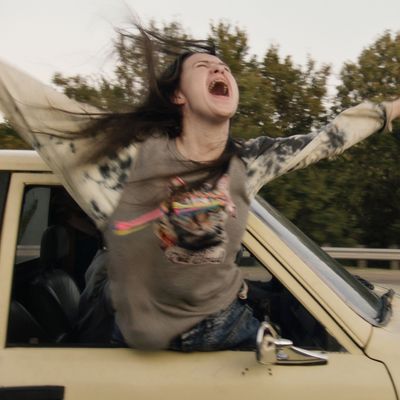
Get on the Maria Bakalova awards train or get off the voting body, as I like to say. On February 3, Bakalova was nominated for Best Performance by an Actress in a Motion Picture, Musical or Comedy for the 2021 Golden Globes. Her performance as Tutar in Borat Subsequent Moviefilm is what director Jason Woliner called the literal definition of courageous acting. The Bulgarian force of nature improvised in multiple languages, stole scenes from Sacha Baron Cohen, steered that moment with Rudy Giuliani, and brought emotional depth to a character who also happens to wear the world’s most frightening merkin. It’s a seemingly impossible balancing act of a performance, meriting a well-deserved nomination. We caught up with Bakalova shortly after she got the news.
Congratulations on your nomination! How are you feeling?
Happy, excited, grateful, humbled. I have no words to describe it … I’m shaking!
Where were you and what were you doing when you heard the news?
We woke up really early, me and my two friends who are staying [with me]. We turned on the TV, connected to the phone, and we were waiting, waiting, waiting, waiting, waiting. And it was just showing stay tuned, stay tuned, stay tuned. I was like, I feel like I’m going to die! I feel like I couldn’t even [process] it until 30 minutes ago. I didn’t even freak out, and now I’m freaking out completely. It’s beyond what I’ve ever dreamed.
Meryl Streep was eligible in this category, and she didn’t get a nomination. You did! You beat Streep!
Meryl Streep is probably one of the greatest actors in the entire world, of all time. She’s my biggest idol. I love her. I admire her. I have no words to describe how grateful and thankful I am to the HFPA that they’re giving me this recognition. It’s the first-ever acting nomination for a Bulgarian in the West. So for everyone back home, it’s probably one of the biggest achievements for Bulgarians, and it brings people hope and happiness and bigger dreams. The sky’s the limit now, somehow. It’s something everyone’s really grateful for, in my country.
What sort of roles are you hoping you’ll be able to see now in Western cinema, for Eastern European and Bulgarian actors?
Just for Western cinema to open doors for many more Eastern European actors and Bulgarians. These people are really hard workers, talented. We’re coming from small resources, and people get creative. So I’m beyond happy that we have this recognition, and I hope that this will open doors for many more projects, many more roles. Roles that are not going to only be portraying Eastern European people as villains or the bad guy. But characters like Tutar — multilayered characters that can make a change, can be good, can bring something positive.
Speaking of Tutar, you made this character so sympathetic. Her emotional arc was grounded and her story was moving, but it’s also this very heightened comedic performance. How did you develop this character, and how did you balance these two modes of performance at the same time?
I have to definitely thank the incredible team that I worked with from the very first audition in England to the last day of shooting, which was probably two weeks before we released the movie.
That’s so crazy.
That was the time when I traveled to the White House and I went to the White House. It was literally two weeks before we released the movie. And that’s because of the incredible, one-of-a-kind Sacha Baron Cohen, who is the creator of this, and the incredible team of writers, like Anthony Hines, Dan Mazer, Dan Swimer, Erica Rivinoja, and Jena Friedman. These people developed this character. And the producers who actually counted on me, that I would be able to handle it. And of course, the emotional parts, which we rehearsed many times with the director Jason Woliner. He brought the heart to the movie somehow, because this emotional story between father and daughter, it’s somehow a love story. It’s kind of a romantic comedy, somehow, between a father that finally is going to start loving his daughter, and a daughter who is going to reject him until the moment when they’re going to finally meet each other equally, which is probably the most important message: How we should all treat each other equally.
What was it like to do scenes where you are speaking in Bulgarian and Sacha is speaking a mix of Hebrew and Polish, and it’s supposed to look like you’re having a conversation with each other in Kazakh?
You have to really concentrate and be disciplined. Everything’s about the timing, and you have to be really clear about what he’s trying to say, and to catch the emotion of what he’s saying, because I have no idea what he’s saying. We have kind of a script. But especially when you’re acting with real people, you have no idea how they’re going to react, what they’re going to say, in which direction our ideas are going to go. So you should be flexible and guess by his voice where we’re going, what the line’s going to be, where he’s going to press a bit more. It’s crazy, like we know each other better than I know myself. [He] can read my mind.
It’s amazing to watch. Was there anything you improvised — either something you snuck in in Bulgarian or maybe a deleted scene or take — that didn’t make it into the movie?
We have so much material from the movie. But unfortunately, to have a movie, it has to be a certain amount of minutes. So there are some really funny moments and some really also heartwarming moments [that were cut], and some really scary moments — because we weren’t only at one rally, we went to another one in Richmond. But this didn’t make it into the movie. We have a scene where we were trying to make my teeth clean — we were with a dentist — which was completely physical comedy. And we had scenes at the debutante ball where I was with the boys, and we were talking about things. There’s been a lot of material that we haven’t seen.
Can you share what you were talking about at the debutante ball?
I remember that at some point, Tutar was trying to communicate with all these people and find her place at the debutante ball. She’s been [saying] she had a boyfriend, she had something with a dog, but he hasn’t been faithful to her. So [one of the boys] asked me — I don’t even remember. It was something terrible. Tutar was going to say, “Oh, I killed 17 dogs. You have a dog? Okay, I’m gonna kill it,” something like that, something horrible.
But in all of these bad jokes, in all of this silliness, there are some really important messages. Because sometimes people are going to support the point of view [you put forth], and sometimes they’re going to completely reject it. Like my incredible babysitter, the amazing Jeanise Jones, who was like, “No, we’re drinking from a glass. And this is not right.”
The scenes with the babysitter were very touching. What’s the most difficult part about acting opposite people who you’re trying to convince that you’re not acting?
The hardest part is that you have to concentrate, and sometimes people are saying things that you could have never imagined. Like at the Pregnancy Crisis Center, where I was thinking that maybe these people are going to get mad at us, they’re going to start yelling at us, or they might start laughing and think that this is a joke. But they were saying things like, “No, you cannot get [an abortion]. You brought this life, so you basically have no choice.” I’d have an intuition to start saying something, but I know that I have to keep quiet. Or when Jeanise is like, “Girl, you have to use your brain, go to school, learn how to do this and that.” And I’m thinking, this person is so incredible. And she’s so worried about this girl that is from some made-up place, this completely fake character. And keeps giving me chance after chance after chance after chance, after tons of ridiculous questions, and sometimes even offensive things that I’ve been saying. I’d be like, God, I want to tell her to not be worried because she’s such a pure soul, such an angel. These moments are hard, because sometimes you want to say, “Really, don’t worry, it’s a fake character,” or “Jesus Christ, what are you doing? Why are you behaving like this?” But you have to keep going.
Were there any times you felt like you were in danger? What was the scariest or most difficult scene that you filmed?
In physical danger? I don’t think I ever felt that way. Because first, we had an incredible security team. And second, Sacha really took care of me the entire process. Also, the people I was interviewing and acting with, they were mostly women, so not as aggressive, not as likely to take a gun and point it at me. I was probably a bit scared at the rallies because Sacha was on the stage. It’s a scary situation. It’s a gun rally. Or when I’m in a room with a really important person — yeah, Sacha’s in the closet six feet away from me. But still, I had to be convincing. So it was mentally scary. Am I going to ruin it? Am I going to reveal that I’m actually an actress? But we were lucky.
Have you heard from Sacha yet since the nomination?
Yes, I did. I heard from Sasha probably 15 minutes after the nominations. I was on the phone with my “family” — I’m going to call them that. My CAA agents, we’ve been together for only three months, but we were all together; we put on a big Zoom to see what was going to happen. And when it happened, it was like, Jesus Christ, this is incredible! And straight after that was Sacha, who is my really good friend, if I can say that now, and my mentor, my teacher. He’s been like a father figure to me this entire process. It’s just beyond, beyond incredible.





